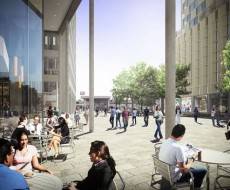April 9, 2014
WorldBlu announces latest additions to its list of democratic workplaces
 WorldBlu, a US based business that promotes democratic workplace design has announced that it has added 41 organisations around the world to its certified list of Most Democratic Workplaces. According to WorldBlu, the organisations range in size from five to 65,000 employees and represent over $13 billion in combined annual revenue and come from the US, Canada, Mexico, UK, Netherlands, Denmark, Malaysia, Haiti, New Zealand, Belgium and Romania from a range of sectors including technology, manufacturing, healthcare, retail, agriculture and services. Organisations become eligible after employees complete the proprietary WorldBlu Design Assessment, a survey evaluating their practice according to the firm’s own ten ‘Principles of Organizational Democracy’, with an overall combined score of 3.5/5 or higher. The awards were announced yesterday, Democracy in the Workplace Day (who knew?).
WorldBlu, a US based business that promotes democratic workplace design has announced that it has added 41 organisations around the world to its certified list of Most Democratic Workplaces. According to WorldBlu, the organisations range in size from five to 65,000 employees and represent over $13 billion in combined annual revenue and come from the US, Canada, Mexico, UK, Netherlands, Denmark, Malaysia, Haiti, New Zealand, Belgium and Romania from a range of sectors including technology, manufacturing, healthcare, retail, agriculture and services. Organisations become eligible after employees complete the proprietary WorldBlu Design Assessment, a survey evaluating their practice according to the firm’s own ten ‘Principles of Organizational Democracy’, with an overall combined score of 3.5/5 or higher. The awards were announced yesterday, Democracy in the Workplace Day (who knew?).

























April 7, 2014
Can building design presage a fall from grace for the world’s tech giants?
by Mark Eltringham • Architecture, Comment, Technology, Workplace design
More →